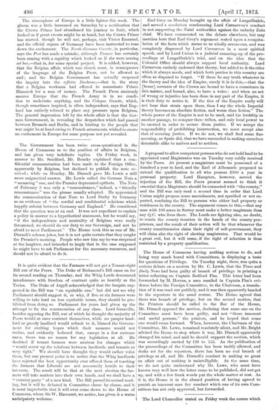It is quite evident that the Farmers will not get
a Tenant-right Bill out of the Peers. The Duke of Richmond's Bill came on for its second reading on Thursday, and the Whig Lords denounced interference with freedom of contract quite as heartily as the Tories. The Duke of Argyll acknowledged that the bargain sug- gested in the Bill was "an equitable one," but did not see why Parliament should suggest it, or why, if five or six farmers were willing to take land on less equitable terms, they should be pro- hibited from doing so. Parliament for years had given up the attempt to fix the remuneration of any class. Lord Granville, besides opposing the Bill, out of which he thought the majority of Peers would at once contract themselves, while no pauper land- lord or greedy landlord would submit to it, blamed the Govern- ment for exciting hopes which their measure would not realise, and evidently believed that, except in a few extreme eases, there was no reason for any legislation at all. He doubted if tenant farmers were anxious for changes which "would screw up the relations between landlords and tenants so very tight." We should have thought they would rather relax them, but our present point is to notice that the Whig landlords have rejected the best opportunity ever offered them of teaching the farmers that Liberals are not necessarily hostile to their interests. The result will be that at the next election the far- mers will take matters into their own bands, and we shall have a "country party" of a new kind. The Bill passed its second read- ing, but it will be debated in Committee clause by clause, and it is most improbable that it will ever come down to the House of Commons, where Sir W. Harcourt, we notice, has given it a warm anticipatory welcome.


































 Previous page
Previous page